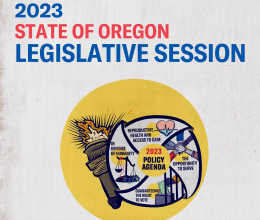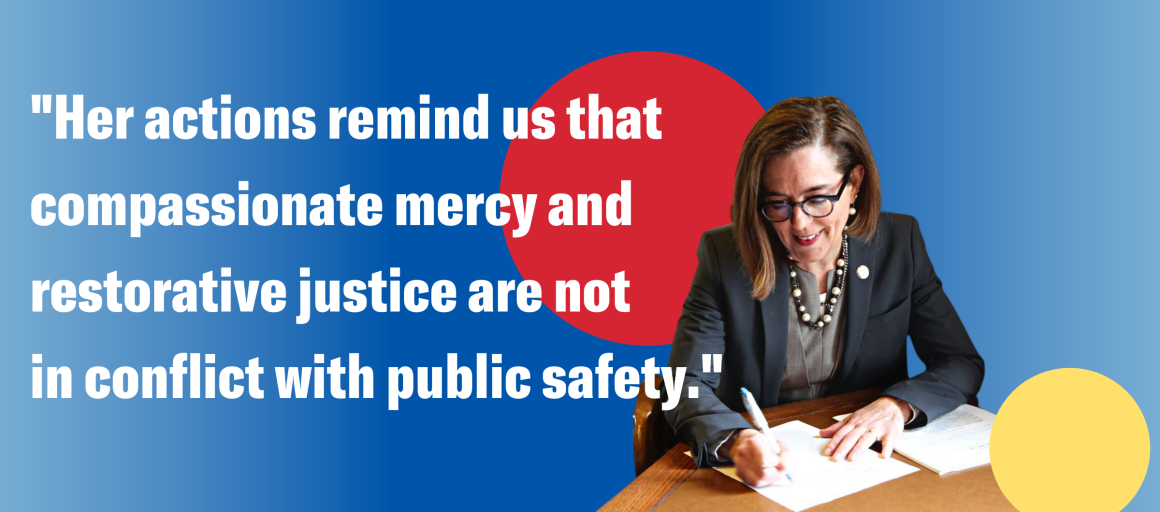
This week, Governor Kate Brown left office, making way for Governor Tina Kotek to transition to power.
As we look to the future, it’s important to remember Gov. Brown’s historic legacy of clemency actions and their impact on racial justice and criminal legal reform.
Her actions remind us that compassionate mercy and restorative justice are not in conflict with public safety. They’re also a reminder that advancing racial justice and criminal justice takes each of us exercising our unique powers and doing our part.
Governors have always had clemency powers, such as sentence reductions, criminal fine and debt forgiveness, and pardons. But they have been rarely used in the past few decades.
Since the “tough on crime” movement of the 1980s, clemency actions became politically risky.
In recent years, progressive organizations and individuals ramped up education and advocacy efforts to encourage clemencies.
In 2020, ACLU National launched the Redemption Campaign to encourage governors to exercise their clemency powers on a larger scale, by showing that clemency is a necessary tool to advance racial justice and reduce mass incarceration. The Lewis and Clark Law School’s Criminal Justice Reform Clinic, led by Professor Aliza Kaplan, helped tell the stories of about 150 people through clemency applications, enabling Gov. Brown to make decisions with fuller context.
Through these stories, Gov. Brown learned about each person’s life, the events that led to their crime, the actions they’ve taken to take accountability and grow, and their plans if released.
The efforts of ACLU National and the Criminal Justice Reform Clinic had a significant impact:
- Gov. Brown commuted the sentences of about 1,000 people to reduce COVID-19 related health risks in prisons and to recognize the incarcerated Oregonians who fought wildfires in 2020.
- She granted 47,274 pardons on marijuana charges and forgave $1.8 million in unpaid court fines and fees in traffic violations that were preventing nearly 7,000 Oregonians from getting their driver’s license reinstated.
- Gov. Brown also commuted the sentences of all 17 individuals on the state’s death row to life in prison without the possibility of parole and ordered the death chamber dismantled.

Gov. Brown intentionally made these decisions to advance racial justice in recognition that Black people are overrepresented in the prison system. Black people make up about 2% of the general Oregon population, but 8% of the prison population.
Out of 130 application-based pardons, 43.8% were Black.
Out of 104 application-based commutations, 36.5% of them were Black.
Gov. Brown’s clemency actions also helped expand the efforts of the judicial and legislative branches, demonstrating the impact of all three branches working toward a common goal:
- In 2019, the Oregon Legislature passed a law limiting capital punishment.
- In 2021, the Oregon Supreme Court ruled that this law applied retroactively.
- And in 2022, Gov. Brown’s commutations of individuals serving death sentences worked alongside the legislative and judicial decisions to further dismantle death sentences in our state.
We are making strides with racial justice and criminal legal reform in Oregon because elected leaders like Gov. Brown and state legislators, the staff who support our elected leaders, the judiciary, communities and everyday people, and justice organizations are all doing their part.
Starting January 17th, we all have the opportunity to participate in the 2023 Legislative Session as Oregon lawmakers grapple with our state’s most pressing challenges and look to all of us for input.
Inspired by the story of Gov. Brown’s clemency actions, ACLU of Oregon looks forward to advocating for policies that continue this momentum to creating an Oregon of greater justice, equity and care.







